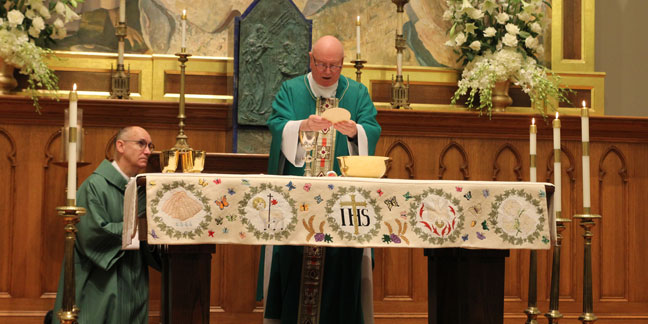 CHARLOTTE — A leading Jesuit liturgical scholar, Father John Baldovin, celebrated Mass and gave a presentation on the liturgy Oct. 29 at St. Peter Church. He is the author of numerous books, including “Bread of Life, Cup of Salvation.” Father Baldovin is a longtime friend of Jesuit Father James Shea, pastor of St. Peter Church.
CHARLOTTE — A leading Jesuit liturgical scholar, Father John Baldovin, celebrated Mass and gave a presentation on the liturgy Oct. 29 at St. Peter Church. He is the author of numerous books, including “Bread of Life, Cup of Salvation.” Father Baldovin is a longtime friend of Jesuit Father James Shea, pastor of St. Peter Church.
Father Baldovin serves as professor of historical and liturgical theology at Boston College School of Theology and Ministry in Newton, Mass. He brought his concise, insightful approach from years of teaching to his presentation “Liturgical Prayer: What do we need today?” to more than 80 parishioners in Biss Hall.
In his initial remarks Father Baldovin addressed that St. Peter Church, being a Jesuit-run parish, has a particular Ignatian focus and his approach to the lecture would in some ways reflect that.
“Our inspiration, our own background that the Jesuits share in spirituality and training, is one of the basic things (found in a Jesuit parish). When the Jesuits were founded, St. Ignatius wanted us to become specialists in the ministries of the Word and of confession. That’s always been a very important thing for Jesuits.”
Father Baldovin noted that Jesuit spirituality is very heavy on experience. It is confident that God can be found in the experience of everyone and everywhere. “‘Finding God in all things’ is what we say. God can be found everywhere,” he said.
He noted that discernment is also important to Jesuits and serves as a means to have confidence that we can find God in our lives.
“I don’t want to talk about just what happens at the altar, because liturgy isn’t just what happens at the altar. Liturgy is what happens everywhere,” Father Baldovin explained. “If the liturgy does not end in you and me offering God ourselves, our whole selves, then something is missing.”
He gave the formal definition of liturgy, saying that liturgy is the formal ritual activity of the Christian community which serves that goal of Christian life as worship.
“Liturgy ultimately has a purpose. It is not a tool but it does have a purpose, and that is to serve the goal of us becoming true worshipers of God in spirit and in truth.”
Another key point Father Baldovin touched on is that in the liturgy there is the same basic dynamic. He noted that we read Scripture before we baptize, marry, anoint the sick and celebrate the Eucharist, for example.
“Why? Because God’s gift to us always comes first,” he said. “Liturgy is never just our good idea. It is our response to God.”
The primary focus of Christian worship is always the same, he said. “It is not us, it is Jesus Christ. We use the term the ‘Paschal Mystery.’ It is a way of talking about the passion, death and resurrection of the Lord. We celebrate it every Sunday – His triumph over sin and death, and our hope of glory.”
Father Baldovin reminded those gathered that the liturgy is always celebrated in light of the Paschal Mystery. “”That means we are always worshiping the Holy Trinity. Every Sunday is Trinity Sunday (in that respect).”
During his 60-minute presentation, he shared some basic principles of liturgy to remember.
“Liturgy is always God’s act first. Liturgy is always what God is doing in our midst before we respond in gift and response… The word liturgy means work ‘of the people.’ The original meaning of the word in Greek means ‘for the people.’”
He also stressed that context is text. Liturgy is a whole experience. It is not just an experience of a text. “You cannot find the experience of the liturgy just in a text… The liturgy is a whole artistic experience. It engages all of our senses.”
Father Baldovin said liturgy should always be related to ordinary life. “One of the greatest challenges is that we intuitively understand what we do when we come together to worship especially on a Sunday liturgy. We come together as God’s people, the Body of Christ. We intuitively understand that it is somehow related to our life. It is very important to keep on working to make those connections.”
He noted that our churches would see more worshipers on a regular basis if people worked harder to understand that.
“Liturgy is a Christian life in a nutshell. It is the Christian life in a ritual form. That’s why it aids us in presenting our bodies to the Lord. That is why every liturgy relates to our need to do peace and justice.”
He also asserted that liturgy is not a tool for manipulation. “We expect entertainment in every moment of our lives… But we don’t go to church for entertainment.
“Liturgy is not a plaything… The liturgy we have can be done well,” he said. “Sometimes liturgy grabs us. It should grab us.
“Liturgy is not an aesthetic form, it is embodied. It is such an embodied experience. Think of the touch, and movement. There is a kind of choreography.”
Ultimately, Father Baldovin said, liturgy leads to adoration.
“The right name for a human being is ‘the person who adores God.’ That is our ultimate end,” he explained. “There are a lot of steps along the way, but that is our ultimate end. We are made to know, love and serve God. Everything on earth is to be used in order to do that.”
— SueAnn Howell, Senior reporter
Read more
Jesuit Father John Baldovin’s book “Bread of Life, Cup of Salvation” is available at www.amazon.com. His 12-part series on “Understanding the History of the Mass” is available at www.nowyouknowmedia.com.


